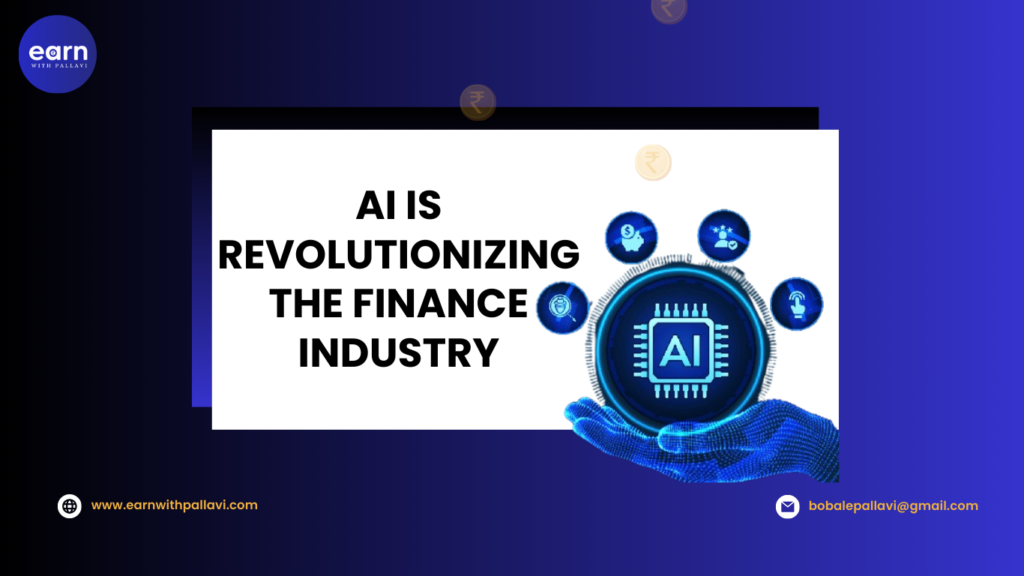How AI is Revolutionizing the Finance Industry in 2024
Artificial Intelligence (AI) is transforming the finance industry in ways unimaginable a decade ago. From advanced data analysis to personalized customer experiences, AI is revolutionizing the finance industry by enhancing accuracy, speed, and decision-making capabilities. In this blog, we’ll explore the profound impact AI is having on finance, and how its applications are reshaping the future of financial services.

The Role of AI in Finance
AI in finance leverages machine learning, natural language processing, and data analytics to optimize financial processes, reduce costs, and improve customer interactions. AI-powered tools can process vast amounts of data, uncover hidden insights, and make predictive analyses, which are critical for informed financial decision-making.
Key Areas Where AI is Making a Difference
- Fraud Detection and Prevention: AI algorithms can identify unusual patterns, alerting financial institutions to potential fraudulent activities.
- Customer Service Enhancement: AI-driven chatbots and virtual assistants offer instant support and are transforming customer service.
- Automated Trading and Portfolio Management: AI is revolutionizing investment management through automation and data-driven insights.
- Risk Management and Credit Assessment: AI improves risk analysis by analyzing a broader range of data sources.
How AI is Revolutionizing the Finance Industry in Fraud Detection
Fraud detection is one of the primary areas where AI is revolutionizing the finance industry. Traditional fraud detection relied on rules-based systems that were limited in scope. Today, AI-powered systems continuously learn from data, identify patterns, and flag suspicious transactions in real time, significantly reducing the chance of financial loss.
Benefits of AI in Fraud Detection
- Real-Time Monitoring: AI enables continuous monitoring of transactions, providing real-time alerts for faster response.
- Pattern Recognition: Machine learning algorithms can detect even subtle signs of fraudulent activity.
- Reduced False Positives: AI improves accuracy, reducing false alarms and improving customer trust.
For an in-depth look at AI’s role in fraud prevention, visit Deloitte’s Insights on AI and Fraud.
The Impact of AI on Customer Service in the Financial Sector
With the rise of chatbots and virtual assistants, AI is revolutionizing the finance industry by enhancing customer service. AI-powered tools enable banks and financial institutions to provide personalized assistance 24/7, addressing common inquiries and even helping with financial planning.
Advantages of AI-Driven Customer Service
- Enhanced User Experience: Chatbots offer quick solutions, improving customer satisfaction.
- Operational Cost Reduction: Automated systems reduce the need for a large customer service team.
- Increased Accessibility: AI-powered virtual assistants provide assistance anytime, removing the limitations of business hours.
AI-driven customer service is now integral to most banking apps, ensuring seamless user experiences and building stronger relationships with customers.
AI in Automated Trading and Portfolio Management
AI has also had a profound impact on trading. Automated trading platforms utilize AI algorithms to analyze market trends, execute trades, and even manage entire portfolios with minimal human intervention. This not only saves time but also optimizes returns based on real-time market data.
Benefits of AI in Automated Trading
- Data-Driven Decisions: AI algorithms make quick, data-backed decisions, improving trading accuracy.
- Reduced Emotional Bias: Automated systems eliminate emotional decision-making, resulting in more objective trades.
- Backtesting and Optimization: AI enables backtesting of strategies against historical data for better predictions.
If you’re interested in learning about AI-powered trading tools, check out NerdWallet’s Guide on Robo-Advisors.
Risk Management and AI-Driven Credit Assessment
In risk management and credit assessment, AI is revolutionizing the finance industry by enhancing the accuracy of evaluations. Traditional credit scoring models relied on limited data points like income and credit history. Today, AI considers numerous factors, providing a more comprehensive analysis of an individual’s creditworthiness.
How AI Improves Risk Management
- Broader Data Scope: AI uses unconventional data points, offering a holistic view of risk.
- Dynamic Risk Assessment: AI algorithms continuously update risk assessments based on new data.
- Enhanced Accuracy: With AI, financial institutions can make more informed lending decisions, reducing the chances of defaults.
In fact, companies like TransUnion are using AI to transform how they evaluate and manage credit risks for individuals and businesses.
Ethical and Regulatory Considerations
While AI is revolutionizing the finance industry, it also raises ethical and regulatory concerns. AI systems must be transparent, explainable, and aligned with data privacy laws to ensure that they do not inadvertently lead to biased or discriminatory outcomes.
Key Ethical Concerns with AI in Finance
- Data Privacy: AI systems use large datasets, often containing sensitive information, which must be protected.
- Bias and Fairness: AI algorithms may reflect biases present in training data, leading to unfair decisions.
- Transparency: The complexity of AI models can make it challenging for users to understand how decisions are made.
Conclusion: The Future of AI in Finance
As we move into 2024, AI’s revolution in the finance industry shows no signs of slowing down. From enhancing customer service to automating complex financial processes, AI is reshaping how the industry operates. However, with these advancements come new challenges, making it essential to balance innovation with ethical considerations and transparency.
Incorporating AI responsibly will empower financial institutions to offer better services, more accurately assess risks, and ultimately deliver better outcomes for clients and stakeholders. To stay updated on AI’s evolving role in finance, explore more at AI and Finance Research Hub.
If you have any questions or need further assistance, please don’t hesitate to contact us — we’re here to help!
